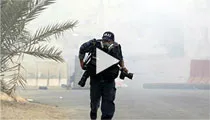As Ukraine prepared to assume the 2013 chairmanship of the Organization for Security and Co-operation in Europe, the nation’s leaders undermined one of the organization’s core values: freedom of the press. Censorship, denial of public information, physical attacks against reporters, and politicized lawsuits against news outlets marred the nation’s press freedom climate, the Kiev-based Institute for Mass Information, or IMI, reported. The boldest attack against the free press was parliament’s vote to criminalize defamation. Legislators were forced to withdraw the bill within weeks in the face of nationwide protests and international outcry. Protests also greeted a government tax investigation into the opposition broadcaster TVi. Starting in July, tax police and prosecutors raided the station’s newsroom and froze its bank accounts. Prosecutors eventually dropped their case against TVi owner Nikolai Knyazhitskiy but imposed a fine against the station. Impunity prevailed in ongoing assaults against reporters, as it did in the 2000 murder of Georgy Gongadze, the first online reporter in the world to be killed for his work. Although the trial of a former Interior Ministry general on charges of carrying out Gongadze’s brutal slaying began in July 2011, the proceedings ground away without resolution in late 2012. The prosecution has been pockmarked by the government’s procedural missteps. In June, an appellate court said prosecutors could not pursue a case against former president Leonid Kuchma, who has long been accused of ordering the murder.
Ukraine
» Parliament votes to criminalize defamation, backs down in face of outcry.
» Opposition broadcaster targeted in politicized tax prosecution.
As Ukraine prepared to assume the 2013 chairmanship of the Organization for Security and Co-operation in Europe, the nation’s leaders undermined one of the organization’s core values: freedom of the press. Censorship, denial of public information, physical attacks against reporters, and politicized lawsuits against news outlets marred the nation’s press freedom climate, the Kiev-based Institute for Mass Information, or IMI, reported. The boldest attack against the free press was parliament’s vote to criminalize defamation. Legislators were forced to withdraw the bill within weeks in the face of nationwide protests and international outcry. Protests also greeted a government tax investigation into the opposition broadcaster TVi. Starting in July, tax police and prosecutors raided the station’s newsroom and froze its bank accounts. Prosecutors eventually dropped their case against TVi owner Nikolai Knyazhitskiy but imposed a fine against the station. Impunity prevailed in ongoing assaults against reporters, as it did in the 2000 murder of Georgy Gongadze, the first online reporter in the world to be killed for his work. Although the trial of a former Interior Ministry general on charges of carrying out Gongadze’s brutal slaying began in July 2011, the proceedings ground away without resolution in late 2012. The prosecution has been pockmarked by the government’s procedural missteps. In June, an appellate court said prosecutors could not pursue a case against former president Leonid Kuchma, who has long been accused of ordering the murder.
Verkhovna Rada, the Ukrainian parliament, passed a criminal defamation bill in September. The legislation would have reintroduced libel and insult—decriminalized in 2001—into the penal code, with prison penalties of up to five years. Facing outcry at home and abroad, lawmakers withdrew the bill in October.
July 18: | Vitaly Zhuravskiy, a pro-government MP, registers the bill in Verkhovna Rada. |
September 18: | A majority of the lawmakers—244 out of 347 present—vote in support of the bill. |
September 25: | Ukrainian media start a nationwide protest called Say No to Defamation Bill, publish lawmakers' phone numbers, and urge readers to protest the legislation. |
October 10: | Verkhovna Rada drops the bill, annuls the September vote. |
During the government's tax evasion inquiry of TVi, at least 80 regional cable companies removed the station's programming from their systems, local and international press reports said. Owner Nikolai Knyazhitskiy told local journalists that, combined with the government-imposed fine, his company suffered losses equal to US$1.2 million.
July 12: | Tax police raid TVi offices and open criminal case against Knyazhitskiy, local press reported. |
July 20: | Local cable companies remove TVi programming from their networks. |
September 12: | A Kiev court rules against TVi and orders it to pay a fine of 4 million hryvnas (US$490,000). The authorities freeze the station's bank accounts. |
September 24: | TVi pays the fine after supporters come to its rescue. |
October 10: | Prime Minister Nikolai Azarov calls on cable networks to carry TVi's programming again. |
Press freedom violations intensified ahead of the October 28 parliamentary election, IMI reported. The group said it had documented at least 60 violations in September alone, ranging from denial of public information to physical assaults on reporters and politicized lawsuits against news outlets. The number was up tenfold from January; both current lawmakers and new candidates were involved in the attacks, the IMI said.
September 20: | Journalist Irina Fedoriv receives anonymous phone threats demanding she stop reporting on the transfer of public lands into private hands. |
September 26: | Investigative journalist Dmitry Volkov is assaulted in Kiev in connection with his reporting on land distribution. |
September 27: | A lawmaker in Lugansk assaults and threatens reporters with the independent broadcaster RTV when they attempt to interview him. |
Aleksei Pukach, a former Interior Ministry general charged with executing Georgy Gongadze, remained on trial at the end of 2012. Valentina Telychenko, a lawyer for the journalist's widow, Myroslava Gongadze, told local reporters that procedural violations had stalled the case. Pukach remained in state custody.

